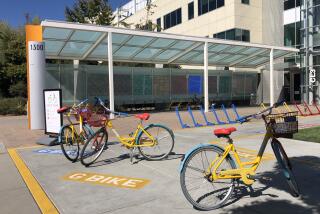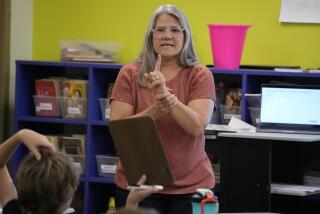Gender gap in STEM fields could be due to girls’ reading skills, not math ability

- Share via
Why don’t more girls grow up to become scientists and engineers? It’s not that they’re bad at math, a new study argues. It’s that they’re even better at reading.
This comparative advantage in reading is the primary reason why women are outnumbered by men in technical fields, according to a report published this month in the Proceedings of the National Academy of Sciences.
The study authors, economists Thomas Breda of the Paris School of Economics and Clotilde Napp of the French National Center for Scientific Research, came to this conclusion by analyzing survey data from 300,000 high school students in 64 countries around the world.
“We tried to understand the reasons why we observe so much segregation between girls and boys in terms of fields of study,” Breda said.
They found that among the students who were better at math than at reading, 68% were boys and 32% were girls. On the flip side, among the students who were better at reading than at math, 68% were girls and 32% were boys.
This gender gap could explain why boys are more likely than girls to take the kinds of classes that lead to careers in the so-called STEM fields — science, technology, engineering and math, the researchers reported.
Previous research has focused on gender discrimination of women in scientific fields and how societal norms influence girls’ career aspirations. The new study is different because it focuses on the strengths of individual students from all over the world.
“People have many different areas that they might like and many different areas that they might be good at,” said sociologist Catherine Riegle-Crum of the University of Texas at Austin, who was not involved in the study.
“When making a [career] decision, it’s about weighing all of those things,” she said. “A lot of past research either hasn’t acknowledged that, or in some cases hasn’t had the data to be able to tease those things out.”
Breda and Napp were able to find that kind of data in a survey called the Program for International Student Assessment, or PISA.
Administered every three years to 15-year-olds in countries from Argentina to Vietnam, PISA catches them before they have to decide which subjects they want to focus on.
The PISA survey administered in 2012 was of particular interest to the economists. In addition to assessing students’ math, reading and science skills, it asked them about their intent to take advanced courses in each of those subjects in the future. It also asked students how they felt about their math skills.
The researchers found that on the whole, boys had a stronger attraction to math classes than girls did. For instance, the proportion of boys who said they wanted to take more math classes instead of more reading classes was nearly 8 percentage points higher than it was for girls. In addition, the proportion of boys who said they intended to “study harder” in math than in reading was almost 6 percentage points higher than it was for girls.
In just a few countries, including Turkey and Malaysia, the proportion of girls interested in studying math was higher than it was for boys.
But in most other countries, boys had the edge over girls — and the gender gap was much bigger. The most extreme example was Switzerland, where 68% of boys and 47% of girls said they were willing to take additional math classes, Napp said.
The researchers wondered whether this difference could be linked to students’ math ability. In other words, are boys simply better at math than girls?
Sort of. On both math and reading tests, the average score for all students was slightly below 500. But on the math test, the average score for boys was about 10 points higher than for girls.
Meanwhile, on the reading test, the average score for girls was about 30 points higher than for boys, the researchers said.
But in both cases, these differences accounted for less than 10% of the gender gap in math interest.
Then the researchers decided to compare each student’s math skills with his or her reading skills. Here, the gender difference was more stark. In looking across the 64 countries, they saw that 59% of boys were better at math than at reading, and that 74% of girls were better at reading than at math, Breda said.
This difference could explain 78% of the gender gap in students’ intent to take more math classes in the future, the economist found.
The results clearly refute the idea that girls don’t have what it takes to succeed in technical careers, Riegle-Crumb said.
“It’s not that they can’t do math,” she said. “It’s that they have some skills and some interests in fields that are even greater than that.”
That insight “is pretty impressive,” said Andrei Cimpian, a developmental psychologist from New York University, who was not involved in the study. “The more you perceive yourself to be good at ‘X’ relative to ‘Y,’ the more you’re likely to pursue ‘X.’”
The economists also wondered how many of the students who said they intended to study math actually went on to do so.
So they questioned about 12,000 15-year-olds from Paris who had taken the PISA survey in 2015. It turned out that about 78% of students who said they intended to pursue advanced math courses did in fact enroll in them the following year.
What’s more, each student’s relative strength in math versus reading was a good predictor of whether they intended to — and ultimately did — enroll in courses that emphasized math.
What the data could not explain was what caused the students to have differences in math and reading ability in the first place.
“These imbalances aren’t due to how boys and girls come into the world, cognitively speaking,” Cimpian said. “They’re due to how boys and girls adapt to what they perceive to be what’s valued in members of their gender.”
Riegle-Crumb agreed and said that if girls are good at both math and reading, they may prefer to study the humanities because careers in those fields tend to be more hospitable to women.
“Why would I pick the one where I’m going to have to struggle to fit in and be exposed to all kinds of bias and stereotypes versus the one that’s going to be welcoming?” she said.






